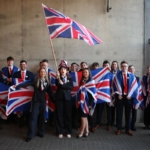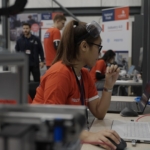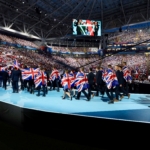Now in its third year, The WorldSkills UK Centre of Excellence developed in partnership with NCFE has involved educators in creating innovative opportunities to engage and develop their learners. Our CPD programme focuses on using competition pedagogy in the learning environment. We see tremendous value in simulating industrial conditions through classroom-based competitions.
We are dedicated to using our unique position as a member of the global WorldSkills network to help UK educators benefit from best practice exchanges through our partnership agreements with countries including: Netherlands; Kenya; Finland; France; Chinese Taipei; South Korea; Taiwan and Japan.
Through our partnership with WorldSkills Netherlands we were able to take educators from four colleges and one independent training provider out to the Netherlands National Finals. Each educator is teaching in science, technology, engineering and mathematics STEM-based curriculum areas.
The ‘Skills the Finals 2023’ was held at Amsterdam’s RAI convention Centre in March 2023. The national competition cycle is like that of the UK, with entrants moving through qualifying heats before competing in national finals. Participation is up by ten per cent this year, so we were privileged to see their biggest and best event to date, with lots of international media attention and a visit from King Willem-Alexander.
There were ‘Skills Talents’ competitions for pre-vocational learners of 14-16 years of age, these are team competitions with specially designed tasks staged over one day. 9,000 pupils were involved in the heats leading to the finals where we saw 450 competitors vying to be crowned national champions. The competitions were across diverse curriculum areas, including construction, business, and commerce, digital, transport, production, installation and energy, care and welfare. In some cases they combined disciplines, for instance one task involved setting up and running a bespoke food truck with dining area, combining skills from cooking, restaurant service and floristry, illustrating how employability as communication skills such as, planning, organisation and teamwork underpinned the activities.
It was a privilege to see first-hand the dedication, concentration, and commitment of all the competitors. What surprised me the most was the enthusiasm and energy, not only of participants, but the organisers too. It was clear to see that the experience of taking part in this competition will change the lives of its participants by opening up so many opportunities for them in their future careers.
The greater part of the event, ‘Skills Heroes’ focused on learners in vocational education, including apprentices. Nearly all Dutch VET colleges participate in around 60 different competitions. 30,000 learners participated in the heats with 500 finalists. At WorldSkills UK we have a saying “seeing is believing” and it absolutely applies when you see skills competitions in action, it is hugely motivating and inspiring for all stakeholders. Learners get to see a range of career opportunities in action, talk to industry partners, find out about the latest innovations and technology, take part in ‘have a go’ sessions and by participating they get that all-important opportunity to benchmark their skills nationally. The educators from the UK benefited from seeing how the physical competitions were organised. They also watched the specific tasks taking place and took home some great ideas for competition activities to run with their own learners.
Since returning from the Netherlands I have spent a lot of time consolidating what we saw into written notes and reflections. A lot of what I have learned relates to the need to really support students with the basics, as they spend so long wanting to do all the fancy stuff, they forget about the simple things.
Experts attending from the Netherlands explained the competition tasks and compared approaches to teaching the same subject. Daniel Hulatt from Bedford college group and Venessa Cox from Firebrand who teach IT and cyber security have continued to collaborate by email with the expert from the Netherlands and have partnered up to collaborate with their learner groups in the UK. Karl Hilton from Coleg Sir Gar came back with a great understanding of the how the CAD competition had been developed and has started to look at equipment to allow his learners to reverse engineer components.
We heard about the education systems of the Netherlands and Belgium and the work being done to raise standards and promote technical and vocational education.
We gave a presentation on the WorldSkills UK Centre of Excellence explaining why and how it was set up, what its impacts are and the plans for the future. Our five UK educators all spoke about the key impacts on themselves and their learners and the different areas of the programme which had most resonated with them:
- strategies for moving from competence to excellence
- use of competition pedagogy to raise standards and engagement
- the ‘personal best philosophy’ enabling every learner to pursue excellence
- the importance of serving the up to date needs of local industry, preparing young people for the world of work
- use of mindset strategies and the WorldSkills UK ‘Learning Lab to build confidence and resilience.
These aspects stimulated an interesting international discussion enabling us all to learn so much from each other. There is huge value in these opportunities to swap ideas and develop national and international communities of best practice. We intend to keep building on these as we move forward into the next phase of the WorldSkills UK Centre of Excellence.


